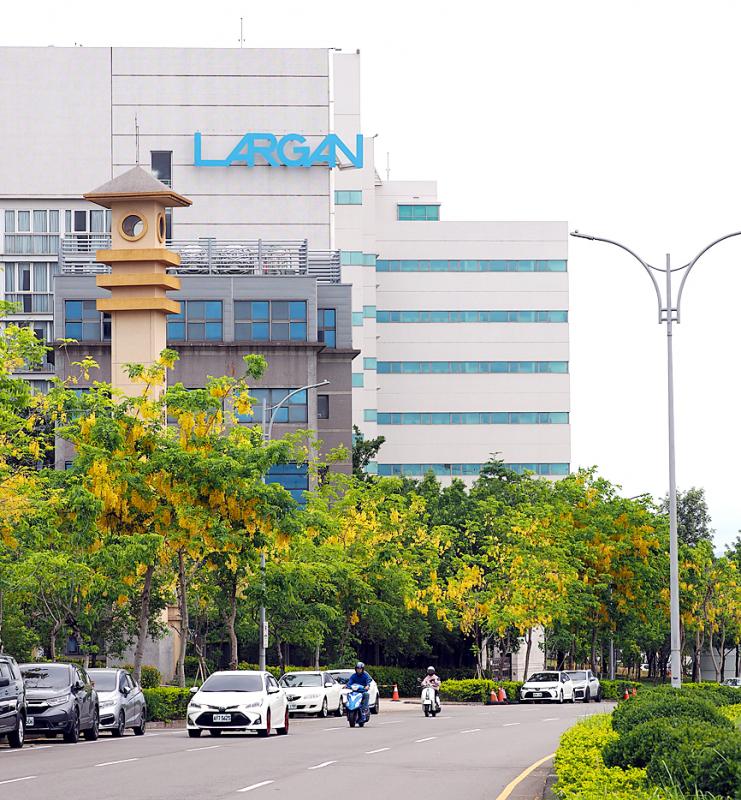Largan Precision Co (大立光) yesterday announced that it had acquired 20 million shares of Ability Optoelectronics Technology Co (先進光電) in a private placement, giving the company a 15.2 percent stake in its smaller rival.
Largan bought the shares at NT$29.92 each for a total of NT$598.4 million (US$21.08 million), it said in a filing with the Taiwan Stock Exchange.
The share purchase came after the two firms on Friday last week reached an out-of-court settlement over an intellectual property rights dispute.

Photo: David Chang, EPA-EFE
Largan first sued Ability in 2012 for allegedly stealing its trade secrets, and the two companies had been involved in a lengthy litigation battle ever since.
While the terms of the settlement were not revealed, it is widely assumed that the share purchase was part of it.
The Chinese-language Economic Daily News quoted Largan sources as saying that the leading handset camera lens maker has no desire to claim a seat on the Ability board or interfere with its rival’s daily operations.
"We believe Ability uses the private placement to compensate Largan by using stocks to repay debt, as part of the terms for the settlement," Capital Investment Management Corp (群益投顧) said in a note. "Largan should have no intention to enter the notebook computer camera lens and automotive camera lens markets with this private placement."
Largan’s purchase price of NT$29.92 per share represented a 41.22 percent discount on Ability’s closing price of NT$50.9 yesterday. Ability shares have jumped 10 percent — the legal maximum daily limit — every day since Friday.
Largan shares yesterday closed at NT$3,525, up 2.92 percent from the previous session and up 4.91 percent from Friday, stock exchange data showed.

Taiwan Semiconductor Manufacturing Co (TSMC, 台積電), the world’s biggest contract chipmaker, booked its first-ever profit from its Arizona subsidiary in the first half of this year, four years after operations began, a company financial statement showed. Wholly owned by TSMC, the Arizona unit contributed NT$4.52 billion (US$150.1 million) in net profit, compared with a loss of NT$4.34 billion a year earlier, the statement showed. The company attributed the turnaround to strong market demand and high factory utilization. The Arizona unit counts Apple Inc, Nvidia Corp and Advanced Micro Devices Inc among its major customers. The firm’s first fab in Arizona began high-volume production

VOTE OF CONFIDENCE: The Japanese company is adding Intel to an investment portfolio that includes artificial intelligence linchpins Nvidia Corp and TSMC Softbank Group Corp agreed to buy US$2 billion of Intel Corp stock, a surprise deal to shore up a struggling US name while boosting its own chip ambitions. The Japanese company, which is adding Intel to an investment portfolio that includes artificial intelligence (AI) linchpins Nvidia Corp and Taiwan Semiconductor Manufacturing Co (TSMC, 台積電), is to pay US$23 a share — a small discount to Intel’s last close. Shares of the US chipmaker, which would issue new stock to Softbank, surged more than 5 percent in after-hours trading. Softbank’s stock fell as much as 5.4 percent on Tuesday in Tokyo, its

The prices of gasoline and diesel at domestic fuel stations are to rise NT$0.1 and NT$0.4 per liter this week respectively, after international crude oil prices rose last week, CPC Corp, Taiwan (台灣中油) and Formosa Petrochemical Corp (台塑石化) announced yesterday. Effective today, gasoline prices at CPC and Formosa stations are to rise to NT$27.3, NT$28.8 and NT$30.8 per liter for 92, 95 and 98-octane unleaded gasoline respectively, the companies said in separate statements. The price of premium diesel is to rise to NT$26.2 per liter at CPC stations and NT$26 at Formosa pumps, they said. The announcements came after international crude oil prices

SETBACK: Apple’s India iPhone push has been disrupted after Foxconn recalled hundreds of Chinese engineers, amid Beijing’s attempts to curb tech transfers Apple Inc assembly partner Hon Hai Precision Industry Co (鴻海精密), also known internationally as Foxconn Technology Group (富士康科技集團), has recalled about 300 Chinese engineers from a factory in India, the latest setback for the iPhone maker’s push to rapidly expand in the country. The extraction of Chinese workers from the factory of Yuzhan Technology (India) Private Ltd, a Hon Hai component unit, in southern Tamil Nadu state, is the second such move in a few months. The company has started flying in Taiwanese engineers to replace staff leaving, people familiar with the matter said, asking not to be named, as the